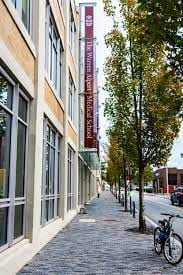Students interested in the humanities and social sciences should refer to the Leadership Alliance Mellon Initiative.
Population Studies

The Population Studies & Training Center (PSTC), an internationally respected demography research and training center, offers an outstanding interdisciplinary graduate training program. Research interests include social demography, economic demography, anthropological demography, and population health.
Environment and Society
 The Institute at Brown for Environment and Society (IBES) is a leading, interdisciplinary institution solving the grandest environmental challenges facing 21st-century society. IBES supports research to understand the interactions between natural, human and social systems. Institute Fellows conduct collaborative research in four interdisciplinary thematic areas: Natural Systems, Food & Water, Human Health & Well-Being, and Equity & Governance. We welcome rising seniors with a background in Environmental Sciences or Environmental Studies, from any physical or social science discipline. The IBES-Leadership Alliance Internship for Advanced Undergraduate Environmental Science and Studies Majors offers many possible research areas highlighted here.
The Institute at Brown for Environment and Society (IBES) is a leading, interdisciplinary institution solving the grandest environmental challenges facing 21st-century society. IBES supports research to understand the interactions between natural, human and social systems. Institute Fellows conduct collaborative research in four interdisciplinary thematic areas: Natural Systems, Food & Water, Human Health & Well-Being, and Equity & Governance. We welcome rising seniors with a background in Environmental Sciences or Environmental Studies, from any physical or social science discipline. The IBES-Leadership Alliance Internship for Advanced Undergraduate Environmental Science and Studies Majors offers many possible research areas highlighted here.
Chemistry and Related Fields
 The Department of Chemistry at Brown maintains world-class facilities that enable scientific inquiry without limitations. Faculty, post-doctoral fellows, graduate, and undergraduate students collaboratively pursue interdisciplinary research within the department aimed at addressing the world’s most pressing challenges. The department welcomes students of all years and experience levels with interests in Chemistry and STEM. A few of the many possible research areas are highlighted here and include projects that intersect areas related to human health, materials science, quantum science, and sustainability.
The Department of Chemistry at Brown maintains world-class facilities that enable scientific inquiry without limitations. Faculty, post-doctoral fellows, graduate, and undergraduate students collaboratively pursue interdisciplinary research within the department aimed at addressing the world’s most pressing challenges. The department welcomes students of all years and experience levels with interests in Chemistry and STEM. A few of the many possible research areas are highlighted here and include projects that intersect areas related to human health, materials science, quantum science, and sustainability.
Earth, Environmental and Planetary Sciences
 The Department of Earth, Environmental and Planetary Sciences (DEEPS) Graduate Program is rated among the top programs in the nation and the world. Faculty members, nationally and internationally acknowledged leaders in their fields, conduct research that spans the study of Earth’s climate and environment, the properties and evolution of Earth’s dynamic interior, and the surface environment and interiors of other planets.
The Department of Earth, Environmental and Planetary Sciences (DEEPS) Graduate Program is rated among the top programs in the nation and the world. Faculty members, nationally and internationally acknowledged leaders in their fields, conduct research that spans the study of Earth’s climate and environment, the properties and evolution of Earth’s dynamic interior, and the surface environment and interiors of other planets.
In collaboration with the Leadership Alliance, DEEPS offers an NSF REU Site: Dynamic Earth in the 21st Century. For more information on faculty mentors and potential projects, please visit the program webpage: https://deepsoutreach.brown.edu/deeps-leadership-alliance-reu/.
We welcome applications from students who have backgrounds in any of these fields: Geoscience/Earth Science, Environmental Science, Physics, Chemistry, Mathematics, Applied Mathematics, Computer Science, Engineering, and Biology.
Potential span a wide range of key science questions. What processes drive climate change and what are the likely conditions of Earth’s future climate? What processes control the occurrence of volcanic eruptions and earthquakes? What are missions to planets such as Mars revealing about the past and present planetary environments and how planetary interiors evolve? What is the structure of the tectonic plates on Earth and what processes drive plate motions, mountain building, and continental break-up?
More information on potential research can be found on the research websites for DEEPS faculty (under Our Faculty Mentors). Some of the possible research areas are highlighted here.
Alpert Medical School
 For students interested in a career as a physician-scientist, the Brown SR-EIP offers an MD-PhD track. Similar to the Brown SR-EIP, the MD-PhD track is a paid research internship with a faculty member. In addition to working in a research environment, students have the opportunity to shadow physicians in clinical settings and participate in a weekly summer seminar at the Warren Alpert Medical School of Brown University.
For students interested in a career as a physician-scientist, the Brown SR-EIP offers an MD-PhD track. Similar to the Brown SR-EIP, the MD-PhD track is a paid research internship with a faculty member. In addition to working in a research environment, students have the opportunity to shadow physicians in clinical settings and participate in a weekly summer seminar at the Warren Alpert Medical School of Brown University.
Students in the MD-PhD track of the Brown SR-EIP will:
· Gain valuable research experience under the mentorship of Brown faculty and post-doctoral researchers
· Have the opportunity to shadow physicians in a variety of clinical settings
· Participate in a weekly seminar introducing students to clinical medicine
· Develop the knowledge and skills to help prepare students for success as physician-scientists
Biological Sciences
 Since 1992, Brown Medical School’s National Heart Lung and Blood Institute (NHLBI), Short Term Training Program has given students access to outstanding researchers in heart, lung, blood, and sleep disorders research. Research experiences have primarily been based in the departments listed above, as well as in the clinical departments of medicine, neurosurgery, orthopedics, pediatrics, and surgery.
Since 1992, Brown Medical School’s National Heart Lung and Blood Institute (NHLBI), Short Term Training Program has given students access to outstanding researchers in heart, lung, blood, and sleep disorders research. Research experiences have primarily been based in the departments listed above, as well as in the clinical departments of medicine, neurosurgery, orthopedics, pediatrics, and surgery.
Students are most frequently offered an opportunity for research with one of the following departments:
Pathology and Laboratory Medicine
Molecular Biology, Cell Biology & Biochemistry (MCB)
Molecular Pharmacology, Physiology & Biotechnology (MPPB)
SR-EIP students are often placed in the Pathobiology Program, an interdisciplinary field devoted to basic research into the mechanisms of disease. There are four major research and concentration themes within the Pathobiology Program: 1) toxicology and environmental pathology, 2) infection and immunity, 3) cancer biology, and 4) aging.
The School of Public Health takes a “lifelong health” approach to improve people’s lives. It begins before conception, through research on environmental exposures that affect fertility and cause birth defects. It continues through the prime of life: public health at Brown focuses on prevention and treatment using a population perspective to promote the health of all individuals so that they can live longer and more fulfilling lives. The School of Public Health’s 12 nationally renowned research centers and institutes focus training and research on key areas including evidence-based medicine, preventive medicine, community health, HIV/AIDS, statistical sciences, global health, and primary care.